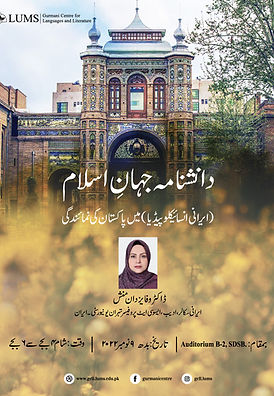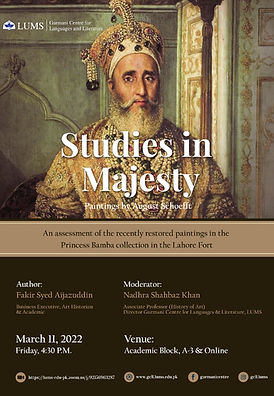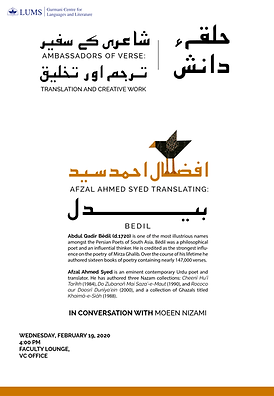
Book Launch
Rebel English Academy by Mohammed Hanif
The Gurmani Centre for Languages and Literature is pleased to invite you to the book launch of Rebel English Academy by Mohammed Hanif, a powerful and darkly comic novel that explores the entanglements of language, power, friendship, and protest in times of political repression.
Hanif’s fiction has consistently engaged with the more complex dimensions of Pakistan’s political and social history through satire, irreverence, and an unflinching critique of militarism, religious authority, censorship, gendered violence, and the everyday workings of power. In Rebel English Academy, these concerns converge in a sharply imagined narrative set in the aftermath of Zulfikar Ali Bhutto’s execution, where language itself becomes a site of resistance. Centered on Sir Baghi’s modest English tuition center—conceived as a space where future “rebels” are trained to doubt and question even while mastering the language of authority—the novel interweaves slapstick,
political thriller, and testimonial narrative to explore dissent under authoritarian rule. Through figures such as a disgraced intelligence officer tasked with crushing protest and Sabiha, a young woman whose written “homeworks” bear witness to political loss and state violence, the novel powerfully examines how gossip, memory, and marginal voices unsettle official truth. Fiercely local yet unmistakably universal, Rebel English Academy is a darkly comic and deeply unsettling meditation on power, protest, and the subversive possibilities of words.
The launch will be an engaging conversation with the author, Mohammed Hanif, moderated by Bilal Tanweer.
Venue: Faculty Lounge, VC Office, LUMS
Date and Time: 5:00–6:30 pm on Thursday, February 12, 2026.
Registration Link: To attend the event, kindly register at: https://forms.gle/RYL95LoFjuiwXHre8
About the Author:
Mohammed Hanif was born in Okara, Pakistan. He graduated from the Pakistan Air Force Academy as a Pilot Officer but later left the military to pursue a career in journalism and writing. He has written for stage, film, and BBC Radio, and has worked extensively with the BBC, serving as Head of the BBC Urdu Service in London and later as a correspondent and special correspondent based in Karachi. His debut novel, A Case of Exploding Mangoes, was longlisted for the Man Booker Prize, shortlisted for The Guardian First Book Award, and won the Commonwealth Writers’ Prize for Best First Novel. His second novel, Our Lady of Alice Bhatti, further established his reputation as a sharp and irreverent chronicler of Pakistani society. Hanif is also the author of the play The Dictator’s Wife, staged at the Hampstead Theatre, and the writer of the feature film The Long Night, set in Karachi. His journalism has appeared in The New York Times, The New Yorker, The Washington Post, and The Daily Telegraph.

%20(For%20Web)_jpg.jpeg)


%20(For%20Web)_jpg.jpeg)
%20(For%20Web).jpg)








%20(For%20Web).jpg)



%20(For%20Web)%20(1).jpg)
.jpg)
.jpg)
.jpg)

.jpg)
%20(Poster)%20(For%20Web).jpg)
.jpg)

![Book Launch Kabir Altaf (11-04-2025) (Poster)(For Web)[1].jpg](https://static.wixstatic.com/media/9e8536_d34a9b0bdb014ce8893df8e6307bc03a~mv2.jpg/v1/fill/w_359,h_524,al_c,q_80,usm_0.66_1.00_0.01,enc_avif,quality_auto/Book%20Launch%20Kabir%20Altaf%20(11-04-2025)%20(Poster)(For%20Web)%5B1%5D.jpg)
%20(For%20Web).jpg)
%20(For%20Web).jpg)


_URDU_.jpg)

%20-%20for%20Web.jpg)


.jpg)
















.jpg)








.jpg)

.jpeg)




![Workshop-Poster[20904].jpg](https://static.wixstatic.com/media/3fc3a4_3e1aee4461c640ee8ce88e027bccb047~mv2.jpg/v1/fill/w_274,h_396,al_c,q_80,usm_0.66_1.00_0.01,enc_avif,quality_auto/Workshop-Poster%5B20904%5D.jpg)


















.jpg)
.jpg)







_jp.jpeg)










